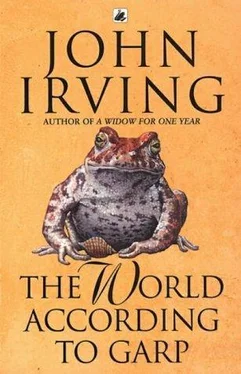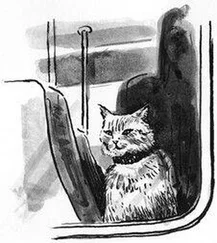In his dream, Garp was looking at what the wrestlers called a wet, split beaver when he heard children crying. He did not know whose children they were, but Helen and his mother, Jenny Fields, were with them; they all came down the stairs and filed past him, where he struggled to hide from them what he'd been looking at. They had been upstairs and something terrible had awakened them; they were on their way farther downstairs—going to the basement as if the basement were a bomb shelter. And with that thought, Garp heard the dull crump of bombing—he noted the crumbling plaster, he saw the flickering lights—and he grasped the terror of what was approaching them. The children, two by two, marched whimpering after Helen and Jenny, who led them to the bomb shelter as soberly as nurses. If they looked at Garp at all, they regarded him with vague sadness and with scorn, as if he had let them all down and was powerless to help them now.
Perhaps he had been looking at the wet, split beaver instead of watching for enemy planes? This, true to the nature of dreams, was forever unclear: precisely why he felt so guilty, and why they looked at him as if they'd been so abused.
At the end of the line of children were Walt and Duncan, holding hands; the so-called buddy system, as it is employed at summer camps, appeared in Garp's dream to be the natural reaction to a disaster among children. Little Walt was crying, the way Garp had heard him cry when he was caught in the grip of a nightmare, unable to wake up. “I'm having a bad dream,” he sniveled. He looked at his father and almost shouted to him, “I'm having a bad dream!”
But in Garp's dream, Garp could not wake the child from this one. Duncan looked stoically over his shoulder at his father, a silent and bravely doomed expression on his beautiful young face. Duncan was appearing very grown-up lately. Duncan's look was a secret between Duncan and Garp: that they both knew it was not a dream, and that Walt could not be helped.
“Wake me up!” Walt cried, but the long file of children was disappearing into the bomb shelter. Twisting in Duncan's grip (Walt came to about the height of Duncan's elbow), Walt looked back at his father. “I'm having a dream !” Walt screamed, as if to convince himself. Garp could do nothing; he said nothing; he made no attempt to follow them—down these last stairs. And the dropping plaster coated everything white. The bombs kept falling.
“You're having a dream!” Garp screamed after little Walt. “It's just a bad dream!” he cried, though he knew he was lying.
Then Helen would kick him and he'd wake up.
Perhaps Helen feared that Garp's run-amuck imagination would turn away from Walt and turn on her. Because if Garp had given half the worry to Helen that he seemed compelled to give to Walt, Garp might have realized that something was going on.
Helen thought she was in control of what was going on; she at least had controlled how it began (opening her office door, as usual, to the slouching Michael Milton, and bidding him enter her room). Once inside, she closed the door behind him and kissed him quickly on the mouth, holding his slim neck so that he couldn't even escape for breath, and grinding her knee between his legs; he kicked over the wastebasket and dropped his notebook.
“There's nothing more to discuss,” Helen said, taking a breath. She raced her tongue across his upper lip; Helen was trying to decide if she liked his mustache. She decided she liked it; or, at least, she liked it for now. “We'll go to your apartment. Nowhere else,” she told him.
“It's across the river,” he said.
“I know where it is,” she said. “Is it clean?”
“Of course,” he said. “And it's got a great view of the river.”
“I don't care about the view,” Helen said. “I want it clean.”
“It's pretty clean,” he said. “I can clean it better.”
“We can only use your car,” she said.
“I don't have a car,” he said.
“I know you don't,” Helen said. “You'll have to get one.”
He was smiling now; he'd been surprised, but now he was feeling sure of himself again. “Well, I don't have to get one now , do I?” he asked, nuzzling his mustache against her neck; he touched her breasts. Helen unattached herself from his embrace.
“Get one whenever you want,” she said. “We'll never use mine, and I won't be seen walking with you all over town, or riding on the buses. If anyone knows about this, it's over. Do you understand?” She sat down at her desk, and he did not feel invited to walk around her desk to touch her; he sat in the chair her students usually sat in.
“Sure, I understand,” he said.
“I love my husband and will never hurt him,” Helen told him. Michael Milton knew better than to smile.
“I'll get a car, right away,” he said.
“And clean your apartment, or have it cleaned,” she said.
“Absolutely,” he said. Now he dared to smile, a little. “What kind of car do you want me to get?” he asked her.
“I don't care about that,” she told him. “Just get one that runs; get one that isn't in the garage all the time. And don't get one with bucket seats. Get one with a long seat in front.” He looked more surprised and puzzled than ever, so she explained to him: “I want to be able to lie down, comfortably, across the front seat,” she said. “I'll put my head in your lap so that no one will see me sitting up beside you. Do you understand?”
“Don't worry,” he said, smiling again.
“It's a small town,” Helen said. “No one must know.”
“It's not that small a town,” Michael Milton said, confidently.
“Every town is a small town,” Helen said, “and this one is smaller than you think. Do you want me to tell you?”
“Tell me what?” he asked her.
“You're sleeping with Margie Tallworth,” Helen said. “She's in my Comp. Lit. 205; she's a junior,” Helen said. “And you see another very young undergraduate—she's in Dirkson's English 150; I think she's a freshman , but I don't know if you've slept with her. Not for lack of trying, if you haven't,” Helen added. “To my knowledge you've not touched any of your fellow graduate students; not yet,” Helen said. “But there's surely someone I've missed, or there has been.”
Michael Milton was both sheepish and proud at the same time, and the usual command he held over his expressions escaped him so completely that Helen didn't like the expression she saw on his face and she looked away.
“ That's how small this town, and every town, is,” Helen said. “If you have me,” she told him, “you can't have any of those others. I know what young girls notice, and I know how much they're inclined to say .”
“Yes,” Michael Milton said; he appeared ready to take notes.
Helen suddenly thought of something, and she looked momentarily startled. “You do have a driver's license?” she asked.
“Oh yes!” Michael Milton said. They both laughed, and Helen relaxed again; but when he came around her desk to kiss her, she shook her head and waved him back.
“And you won't ever touch me here,” she said. “There will be nothing intimate in this office. I don't lock my door. I don't even like to have it shut. Please open it, now,” she asked him, and he did as he was told.
He got a car, a huge Buick Roadmaster, the old kind of station wagon—with real wooden slats on the side. It was a 1951 Buick Dynaflow, heavy and shiny with pre-Korea chrome and real oak. It weighed 5,550 pounds, or almost three tons. It held seven quarts of oil and nineteen gallons of gasoline. Its original price was $2,850 but Michael Milton picked it up for less than six hundred dollars.
Читать дальше












